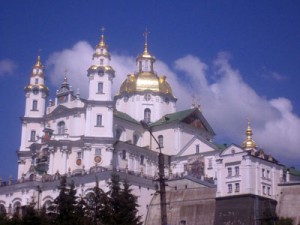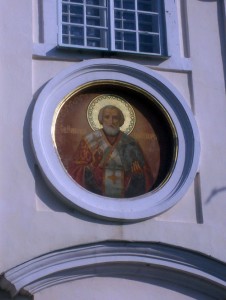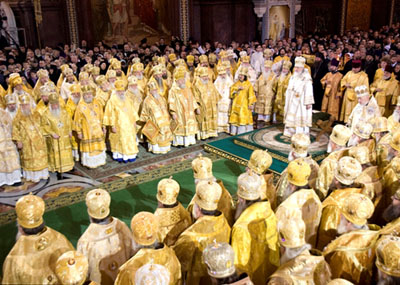I recently discovered that I am doomed to face a fiery eternity in hell for doing yoga. I used to think I was a good person– as a regular college student, I’m no saint, but I hadn’t thought of myself as a particularly bad sinner. Until a week ago, I thought I belonged, at worst, in purgatory. That was all before I went to an Orthodox Christian monastery and learned just how terrible a person I truly am in the eyes of God.

First, a little background about my personal religious history. Being agnostic has always tempered my encounters with religion. I had a chance to experience many religions in the places where I have lived, but I took them all with a grain of salt. I went to a Buddhist monastery in a high rise building in Hong Kong; I listened to an organ in the German church were Johann Bach worked; I gave food to Buddhist monks in a traditional Thai ritual; I debated role of women with my Muslim friends, and went to a Baptist sermon in the US South.
The only religion I have always been obsessively fleeing is Orthodox Christianity — the religion to which I supposedly belong.
I was baptized when I was three. Most Russian parents, religious and secular alike, follow that tradition. Many people in my generation feel that baptizing unsuspecting children is a violation of their human rights. It always made me angry to know that when I was an infant, some bearded man immersed me in water three times in the name of Holy Trinity — without asking for my consent. It could have been worse (think recent and not so recent sexual abuse scandals in another prominent religion), but it’s of no comfort to me. Ever since I was old enough to realize that I was forced into a religion, I have despised all things Orthodox Christian.
At my baptism, I was given a cross, which was misplaced several years later. I don’t know if I have any godparents and don’t have any intention of finding out. I don’t know where I was baptized. I’ve never read the Bible, although I have read most of the Koran, some of the Torah and various Buddhist manuscripts.
It has always been that way: I never got along with the predominant religion in my part of Russia. Save for a few weddings and funerals, which are usually performed at churches, even for non-believers, I have been inside a church only a few times, mostly on tours while traveling. Most of my post-USSR Christian friends are non-believers, so I never had a chance to learn about any positive aspects of Christianity, like spiritual betterment. Instead, my friends told me truly terrible stories about going to church for the very first time in attempts to seek guidance: the priests simply yelled at them for being sinners who could not be saved. I did hear stories about great, nice, friendly and supportive Russian Orthodox priests, but they appear to be legendary, mythical creatures who live in the Land of Faraway.
Returning to the story of how I learned of my brimstone-filled-fate: I was bored to death on a weekend at a spa in Western Ukraine. There was a state of emergency in place in the region, so I could only go visit a few places — most bridges were washed away and the roads were destroyed. The Internet wasn’t working, and I’d I left my laptop in Kiev besides. The only tour available was to a major monastery, a very important place for any Orthodox Christian.

It was meant to be a religion-oriented tour — a pilgrimage of sorts. I always reckoned that sort of thing is done via climbing uphill barefoot while observing lent. Instead it was done aboard an air-conditioned bus. However, women in attendance were required to dress as “proper Christians.” I used to have a Muslim roommate who looked very fashionable in a headscarf, but I can’t pull it off. To worsen the situation, I had to team it up with a very long skirt. Upon entering the church’s premises, an armed guard informed me that a proper Christian woman is not allowed to wear makeup, dye her hair or get manicures/pedicures. With my mascara, highlights, and red finger-and-toe-nails, I wasn’t off to an auspicious start.
While the rest of religion tourists crowded inside a church, I sat outside the cathedral in a headscarf with my knitting, feeling my most decent and modest ever. What naiveté — a female passerby began yelling at me. Knitting on a Sunday turned out to be a sin. I wondered if yelling at non-believers is one, too?
I can decipher that woman’s anger. Her and I are hell-bound for just being female. Testosterone is clearly the hormone of choice in Orthodox Christianity. Women can’t be priests. Menstruating women are considered “dirty” and are not allowed inside a church, because they will “contaminate” it. All forms of contraception are prohibited, which means a woman has no control over how many children to have. We must be a nation of masochists, for despite these sexist rules the vast majority of church-goers that day were women.
I worsened my sinfulness by refusing to kiss two glass boxes filled with the mummified remains of two saints. I always liked the Egyptian section in museums, but it never occurred to me to kiss the glass boxes with the mummies. So why do that in a church?Kissing icons is a very old Orthodox tradition designed to venerate the deity or saints portrayed on them. It might be life-transforming, but it’s also unhygienic, unless the supposed sanctity kills all bacteria and viruses. I didn’t care if it was God’s will, science, or the elements that saved the bodies from rotting — I had no intention of touching the glass with the saliva of thousands of fanatics. When I turned around to escape, a priest nearby proclaimed I would burn in hell. Strike three.
His threats didn’t bother me. By that time, I was quite convinced I was bound not only to burn, but to slowly deep-fried and simmer. You see, I had discovered a startling list of rather unconventional sins posted on the church wall. Alongside the ten commandments and DUI, there were some that were new to me, including but not limited to…
* practicing yoga
* martial arts
* taking contrast showers
* and of course, giving human names to pets
My soul thus doomed to an eternity of hellfire, I headed back to the spa for my sinful massages and yoga.


